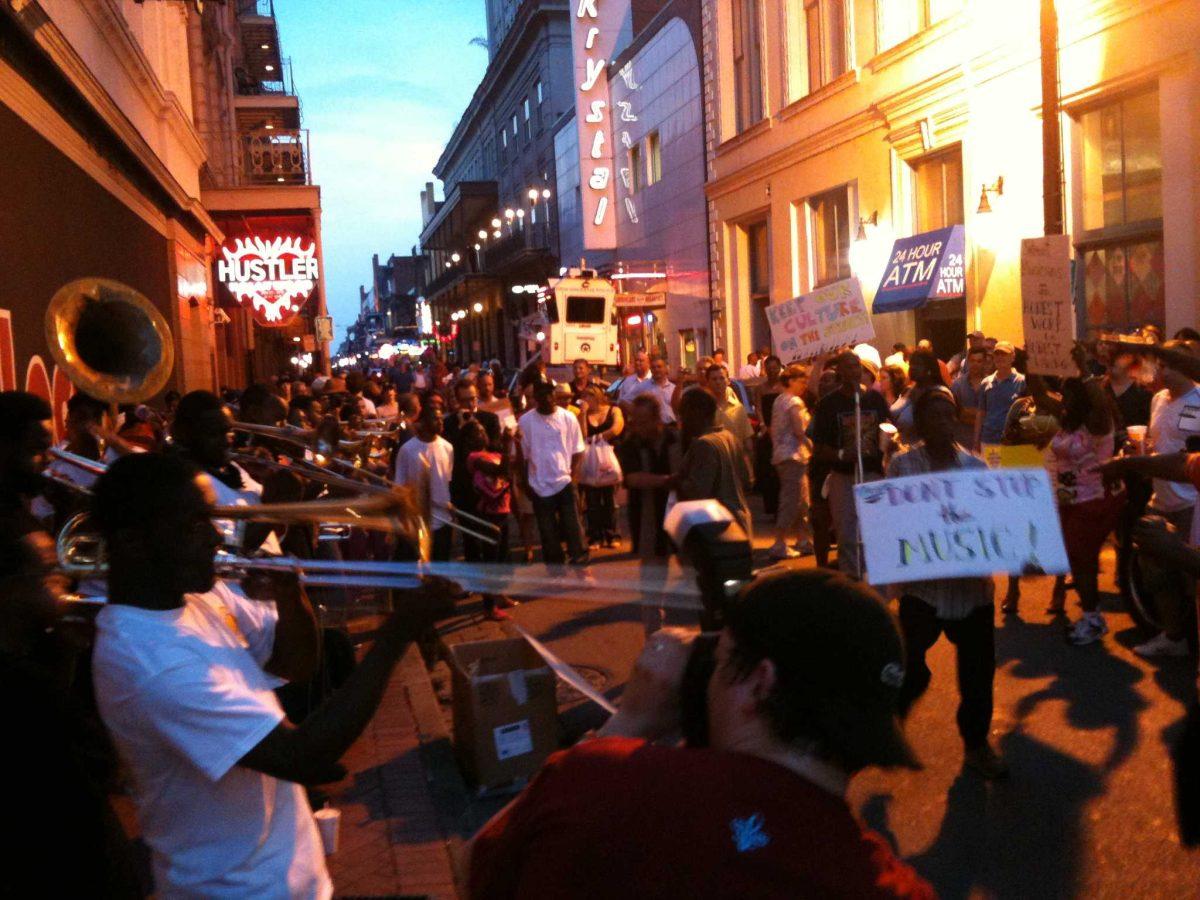When the members of To Be Continued Brass Band took to the streets of the infamous New Orleans French Quarter on June 15, they didn’t expect to be ordered to stop playing their jazz tunes. But that night, as the brass band roared through its catalog of soulful New Orleans-esque tunes, a police officer handed the band members an ordinance citing an 8 p.m. curfew for street musicians.The curfew, which is being put into effect amid an abundance of protest, makes it unlawful for street entertainment to be performed between 8 p.m. and 6 a.m. from the entertainment district of Bourbon Street to Canal and St. Ann streets. Another ordinance brought to the musicians’ attention makes it unlawful for any person to play a musical instrument on any public right-of-way in the city between 8 p.m. and 9 a.m. unless granted a permit. Now, in addition to their trumpets and saxophones, the members of To Be Continued and other musical staples of the French Quarter can often be seen holding signs reading “Please Don’t Stop the Music” and other marks of protest.”[Bourbon Street] is the birthplace of what we do,” said Sean Roberts, a trumpet player in To Be Continued. “It’s the most famous street for people to come and see what you invented, and we are a representation of that. So why wouldn’t you want your representatives to represent you?”Roberts is one of many musicians currently in discussion with New Orleans law enforcement to find a way to make the ordinance mutually beneficial for the residents of the city and the entertainers. Lisa Palumbo, manager of To Be Continued and marketing professor at the University of New Orleans, said the band — which has performed in the French Quarter since 2002 — never had a problem with playing its music until a few weeks ago.”We’re not trying to make the French Quarter unavailable for anybody, but the 100 block of Bourbon is there for entertainment and commercial purposes,” Palumbo said. “We’re not trying to play all day or all night in any area. We’re just looking for a curfew that is reasonable for all parties involved.”Palumbo said she and other entertainment-affiiliated residents of New Orleans affected by the ordinance are working with attorneys to analyze the legal end of the matter.”One of the ordinances appears to be unconstitutional because it’s overreachable and unenforceable,” she said. Ronal Serpas, recently-appointed New Orleans Police Department superintendent, said he recognizes the concerns brought about by those invested in the “uniqueness of the historic French Quarter” but intends to enforce the ordinances.Serpas issued a June 17 statement saying, “NOPD has been approached repeatedly by residents who seek enforcement of these statutes … We will continue to encourage all persons to respect the ordinances of the City of New Orleans and the concerns of all those who live and work in the historic French Quarter.”Roger Jones, a quality of life officer for the New Orleans Police Department, said the curfew has been in existence for many years, despite the fact that NOPD has not enforced it as “avidly” as it is now.”Post-Katrina, things have gotten out of control and fallen to the wayside,” Jones said. “The French Quarter is still a neighborhood. We get complaints from people who can’t sleep because a person is playing a saxophone in front of their house late at night.”Jones said both residents and business owners have complained about the late-night noise and that the police department is aiming to encourage people to share the New Orleans hotspot.”I understand the city being known for entertainment and music,” he said. “I’ve talked to people all over the country who have complained about it. But basically we’re just asking everyone to share the French Quarter.”One restaurant owner said bands playing in the 100 block of Bourbon Street create an impediment to accessing parking garages in the area.”To me, it’s not about the noise,” said Melvin Rodrigue, chief operating officer for Galatoire’s Restaurant, which is located at 209 Bourbon St. “It’s about the accessibility of the French Quarter. Local restaurant goers can’t make it into the 100 block of Bourbon because it’s blocked off by the musicians.”Jones said NOPD has been asked to “ease off” of the ordinance until the City Council can make further determinations about the law, but that hasn’t stopped musicians and New Orleans residents from lining the streets to protest.It also hasn’t stopped Facebook users from taking a stance on the issue.Palumbo started the Facebook page “Don’t Stop the Music. Let New Orleans Street Musicians Play!” within hours of the first incident in which To Be Continued was ordered to stop playing.Palumbo said the page averaged 2,000 new members per day for the first 10 days. The page — which is plastered with an array of comments protesting the ordinances — has garnered more than 16,000 members since its creation.”This music, these musicians, the sounds in the air at night are part of the fabric of our lives here,” the Facebook page says. “The importance of that same music to the tourists who come here cannot be underestimated.”Deanna Cuevas, mass communication sophomore, said jazz music is what makes New Orleans what it is.”You expect to hear the music, and it gives you the cultural feel,” Cuevas said. “If you’re living in the French Quarter, it should be because you want to be around the culture.”
—-Contact Matthew Jacobs at [email protected]
New Orleans law enforcement ordering French Quarter street musicians to honor 8 p.m. curfew
July 7, 2010
Musicians play on the streets of the French Quarter while onlookers support them with signs.



